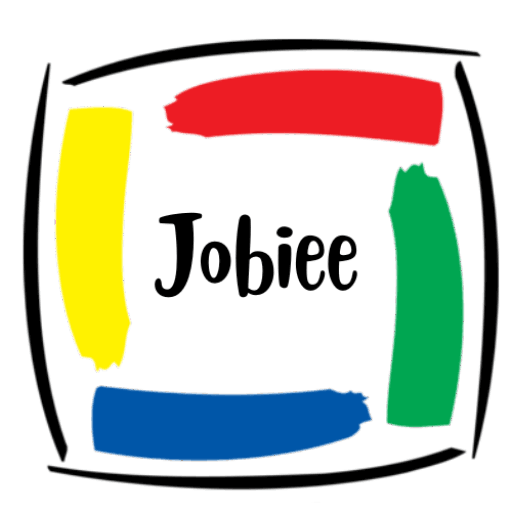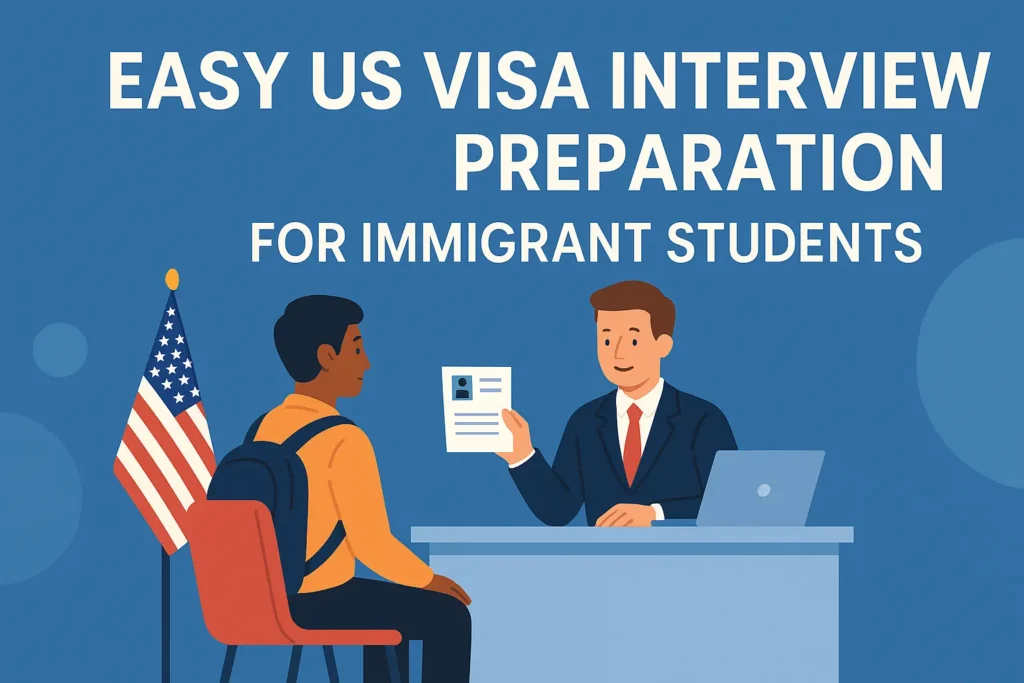Preparing for your US student visa interview can feel stressful. But with the right steps and clear preparation, you can face the interview with full confidence. This guide will help you to understand the process, collect the right documents and practice the best ways to answer the interview questions.
What is the US F‑1 Student Visa Interview?
The F‑1 visa interview is a short meeting between you and a US consular officer at an embassy or consulate. The goal is to confirm that you are a genuine student, you have enough funds and you plan to return to your home country after your studies.
Where does it take place?
At the nearest US embassy or consulate in your country.
How long does it take?
Most interviews last only 2–5 minutes. You’ll be asked a few direct questions and your answers help the officer decide if your visa should be approved.
Do You Need an Interview for a Student Visa?
Yes, most applicants for F‑1, J‑1, or M‑1 visas must attend an interview. However, there are a few exceptions:
Who is exempt?
- Applicants under age 14 or over age 79 may not require an interview.
- Some visa renewals can skip the interview under the Interview Waiver Program.
Check the specific rules for your country on the US embassy website.
When should you schedule the interview?
You can book the visa appointment after receiving your I‑20 form. It’s better to schedule early because slots fill quickly during student seasons (June–August and December–January).
Documents Required for US Student Visa Interview
Bringing the correct documents is essential. Keep them neatly arranged and ready to show. Missing documents can cause delays or denial.
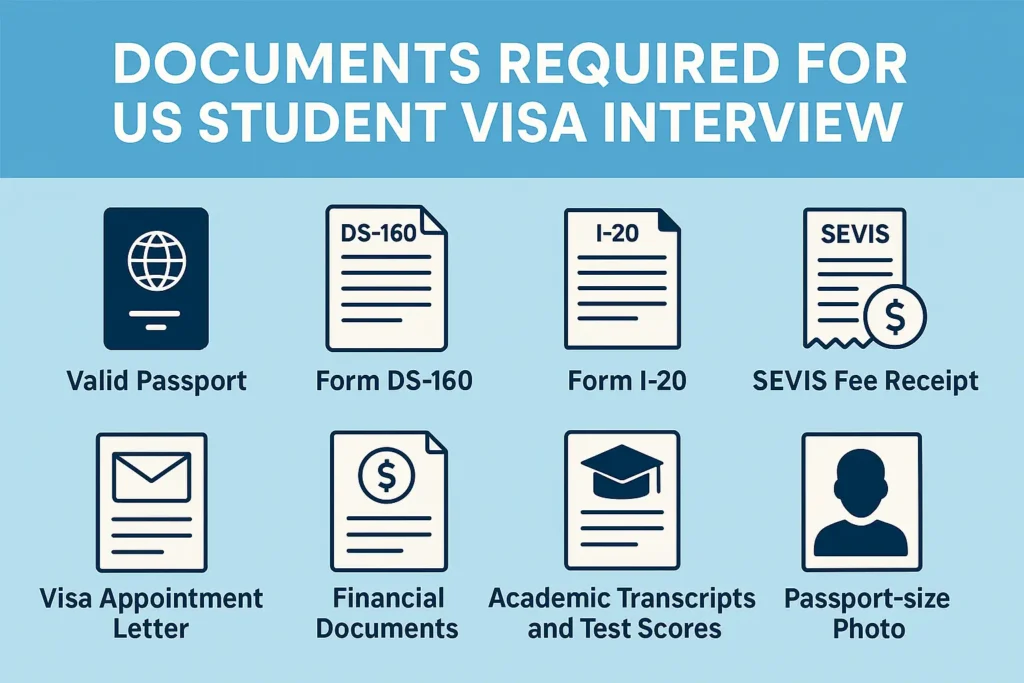
- Valid Passport – Must be valid for at least 6 months after your intended arrival in the US
- Form DS‑160 – Completed online and printed confirmation page with barcode
- Form I‑20 (or DS‑2019) – Sent by your US school
- SEVIS Fee Receipt – Proof of I‑901 payment
- Visa Appointment Letter – Confirmation of interview date
- Financial Documents – Bank statements, loan letters, sponsor affidavit
- Academic Transcripts and Test Scores – School marksheets, certificates, IELTS/TOEFL, SAT, GRE
- Passport-size Photo – As per embassy rules
Tip: Carry both originals and photocopies of all key documents. Place them in a folder or transparent file to stay organized.
F‑1 Visa Interview Tips and Checklist
A strong interview depends on how clearly and confidently you explain your plan.
Dress Professionally
Wear neat, clean clothes. Choose formal or business casual clothing like:
- Shirt with trousers or a formal dress
- Avoid jeans, T‑shirts with logos, caps, flashy jewelry
Your appearance creates a first impression. Be simple and confident.
Practice But Don’t Memorize Answers
Don’t learn a script. Instead, understand your reasons and speak naturally.
- Know why you chose your course and university
- Be ready to explain how it connects to your goals
- Practice speaking English, but don’t sound robotic
“Know your narrative. Don’t memorize speeches. The officer wants to see honesty.”
Show Strong Ties to Your Home Country
The officer must believe you will return after your studies.
- Mention your family, job plans, or business goals at home
- Avoid saying you want to stay permanently in the US
Know Your Financial Plan
You must clearly explain how you’ll pay for tuition and living expenses.
- Be honest about sponsors (parents, bank loans, scholarships)
- Don’t guess—use numbers if needed
Example:
“My father is sponsoring me. He works at XYZ Company and earns $45,000 per year. We have $30,000 in savings and an education loan approved for $20,000.”
Common F‑1 Visa Interview Questions & Best Answers
The most asked questions are given below, based on actual interview records and embassy websites.
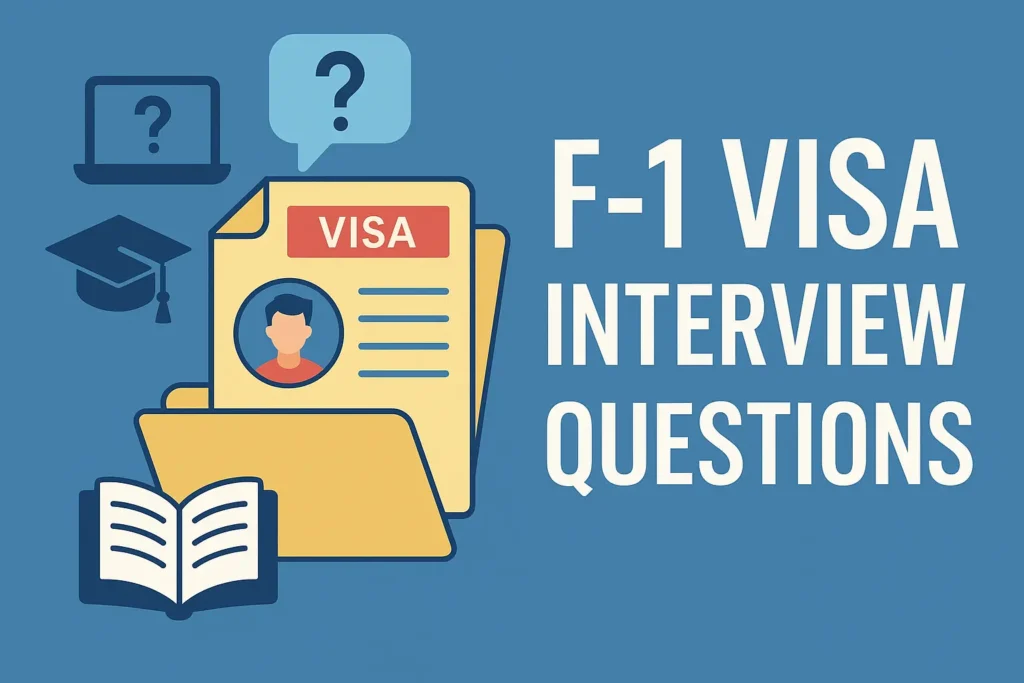
1. Why do you want to study in the US?
Mention quality education, international exposure and how US courses match your career goals.
Answer tip:
“I want to study computer science in the US because their programs focus on real-world problem-solving and the faculty have industry experience.”
2. Why this university?
Talk about the program, ranking, location, or a professor whose work you admire.
3. Who is sponsoring you?
Be clear and specific. Give names, roles and proof of income or bank statements.
4. Do you plan to return to your home country?
Say yes and explain your future plan, like starting a business, joining a company, or family commitments.
5. What does your sponsor do?
Mention their job title, employer and monthly or yearly income.
Real Student Experience: What Works in the Interview
Many students share their experiences on Reddit and YouTube. One popular story involves a student who had their F‑1 visa approved in just 40 seconds.
What did they do right?
- Greeted the officer politely
- Gave clear and short answers
- Maintained eye contact and a calm voice
- Had documents ready but didn’t need to show them
Reddit Advice:
“Don’t overthink it. Just know your story and speak honestly. Don’t memorize. Stay calm.”
Example:
Officer: Why do you want to study in the US?
Student: Because the US has strong programs in data science. My university provides hands-on experience, which fits my goals.
New Policy Alert: Social Media Vetting
In June 2025, a new guideline was announced where student visa applicants’ social media may be reviewed during processing. This is part of an effort to identify high-risk entries and verify intent.

What does this mean for you?
- Your LinkedIn, Facebook, Instagram, etc. may be checked
- Officers will look for red flags, such as contradictory public statements
- Posts promoting illegal behavior or fake information can affect approval
What can you do?
- Set personal accounts to private
- Avoid any inappropriate or offensive content
- Keep your LinkedIn and academic profiles professional
- Make sure your online activity matches your visa story
Mistakes to Avoid in Your F‑1 Interview
A small mistake can lead to a visa denial. Many rejections happen due to reasons that could be avoided with preparation.
Top Mistakes:
- ❌ Memorized or fake answers
- ❌ Nervous or rushed responses
- ❌ Inconsistent statements
- ❌ Unclear financial support explanation
- ❌ Missing key documents
- ❌ Poor English communication
Tip: You don’t need perfect English. Just speak clearly and confidently.
What Happens After the Interview?
The outcome of your visa interview is usually told right away. Here are the three possible outcomes:
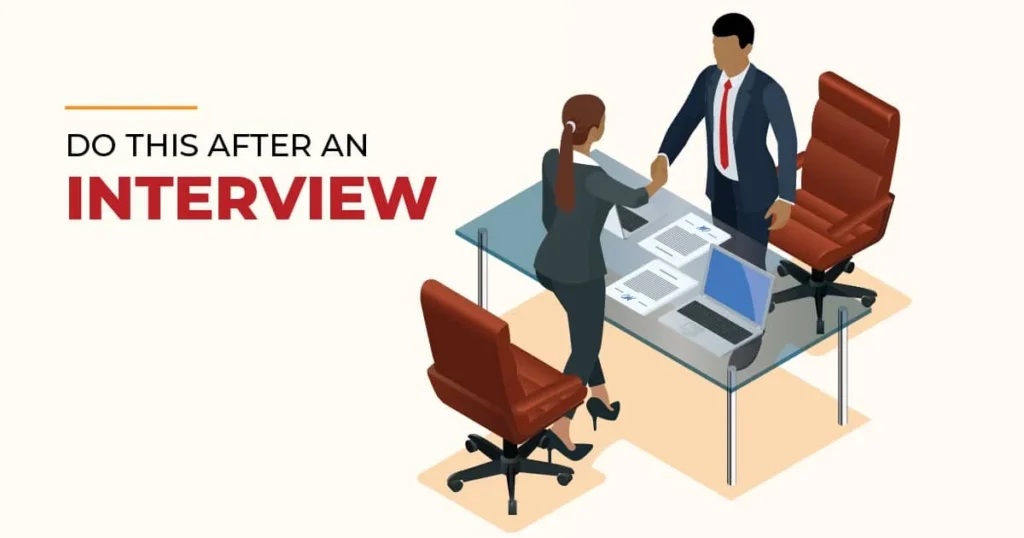
✅ Approved:
- Officer keeps your passport
- You’ll get your visa-stamped passport within 5–10 working days
- Track delivery status on the embassy’s site
⏸️ 221(g) – Administrative Processing:
- Means they need more documents or time
- You’ll get a letter stating what is required
- Respond quickly with requested details
❌ Denied:
- You’ll get a reason, usually under section 214(b) (failure to prove non-immigrant intent or financial support)
- You can reapply, but only after fixing the issue
Conclusion: Be Clear, Be Confident, Be Yourself
The US visa interview is short, but your preparation matters. You don’t need to be perfect just honest, confident and well-prepared. Know your course, funding and future plans. Practice speaking clearly. Organize your documents. And don’t try to impress just be genuine.

